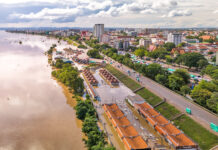Azlan Othman
Brunei Darussalam, which recorded weak growth for most of 2021, is set to grow by 3.5 per cent in 2022, followed by three per cent in 2023, said the Organisation for Economic Cooperation and Development (OECD) in its recent report on Economic Outlook for Southeast Asia, China and India 2022 – Financing for Sustainable Recovery from COVID-19.
The economies of the Association of Southeast Asian Nations (ASEAN) are projected to grow by 5.8 per cent in 2022 but there are significant uncertainties from Russia’s invasion of Ukraine to immediate risks such as the COVID-19, rising inflation and supply chain disruptions, said the report.
“Nevermind the impact of the war in Ukraine, the Omicron variant and potential new variants of COVID-19 are major areas of risks,” head of the Global Economy, Directorate-General for Economic and Financial Affairs at the European Commission Moreno Bertoldi said at a webinar launch of the report.
The Ukraine war, he said, is causing a strong supply shock globally. This adds further to the inflationary pressures and disruptions that had already been triggered by the COVID-19 pandemic.
“The moves in commodity prices and financial markets since the outbreak of the war could also put the recovery of Asian economies at some risk, though we expect the overall impact to be smaller in Asia than in OECD economies,” he added.
So far, the most immediate impact for Asean economies is seen in the prices of energy and agricultural commodities.
Bertoldi warned, “It’s important to note, though, that the current price spike does not reflect in our view, real shortages in supply just yet.”
The Ukraine crisis is also having a significant negative impact on confidence, which in turn will negatively impact private consumption and business investment decisions, he said.
“Growing uncertainty could increase capital flow volatility in Asean countries and elsewhere. Governments in the region therefore need to continue to implement effective macroeconomic and structural policies to safeguard their economies and to minimise the impact of these developments on consumers and businesses,” he said.
According to the OECD report, led by head of the Asia Desk at OECD Development Centre Kensuke Tanaka, the pandemic has inflicted substantial damage on labour markets in
emerging Asia.
“This deterioration has been particularly acute in the Philippines and Vietnam. In terms of individual sectors across emerging Asia, the impact has been especially heavy for the micro-, small- and medium-sized enterprises. Sectors of the economy that are especially cyclical, and indeed those that rely on face-to-face interactions, have endured the gravest job losses since the onset of the COVID-19 crisis.”
Tanaka said international trade was the main engine of recovery for the region in 2021, and merchandise exports in Indonesia, Malaysia, Thailand, Vietnam, China and India have exceeded their pre-pandemic levels in recent months.



















































